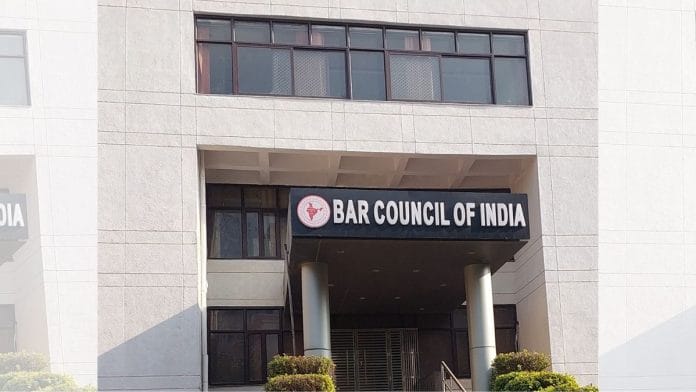New Delhi: Expressing “profound concern” over the proposed draft Advocates Amendment Bill, 2025, the Bar Council of India has written to Union Law Minister Arjun Ram Meghwal, saying the bill would have serious implications for the legal profession if enacted in its current form.
The representation added the bill would undermine the autonomy and integrity of the Bar Council of India.
The letter, sent to Meghwal Wednesday, assumes significance as it has been released in the backdrop of an ongoing strike by district court lawyers in Delhi against the bill.
By way of the letter, Bar Council of India (BCI) chairman and senior advocate Manan Kumar Mishra said that despite several rounds of discussions with the law secretary and the chief controller of accounts, the final draft of the bill contained provisions that were a complete deviation from what had been agreed upon, and were “unilaterally inserted”.
Underling that such provisions required “immediate attention”, “rectification” and removal, the letter added lawyers throughout the country were agitated and that a strong protest “is bound to occur” if such “draconian provisions” were not removed or amended.
“The lawyers of Delhi District Courts have already gone on strike and this protest is likely to spread throughout the country if no positive assurance from (the) Ministry is made soon,” the letter said.
Provisions flagged by BCI
One contentious provision flagged by the BCI was Section 4(1)(d), which allows the Centre to nominate up to three members to the body.
Saying such a provision was “fundamentally opposed to the structure and independence” of the BCI, which is a democratically elected body representing 27 lakh advocates of the country, the letter added it was inserted arbitrarily, without any proper discussion.
“Allowing government-nominated members would compromise the autonomy of the Bar Council, turning it into a government-regulated body rather than a self-regulating professional body. We strongly urge the Hon’ble Minister to delete this provision in its entirety,” the BCI said.
Another controversial provision flagged by the BCI related to the regulation of foreign lawyers and law firms.
Citing the A. K. Balaji judgment (2018), the BCI said the Supreme Court had placed the responsibility of regulating foreign law firms and lawyers on the BCI. Moreover, the BCI Regulations, 2022, already provided a comprehensive framework for the entry of such firms, with ample safeguards and requirements for the Centre’s approval.
“The Ministry’s draft, however, proposes to shift this regulatory authority to the central government. Such a move contradicts the judgment and creates unnecessary confusion. The Bar Council is equipped to regulate foreign entities in legal practice while ensuring the interests of Indian lawyers are protected,” it said.
Other provisions the BCI has objected to include Section 49B, which allows the Centre to issue “binding directions” to the BCI. Terming this as “wholly unacceptable”, the BCI said it was designed to be a “self-regulating body”, and thus, the provision undermined its authority and independence.
Besides this, the BCI has expressed concerns against Section 24, which allows the Centre to determine the enrollment fee. While the BCI had proposed a fixed enrollment fee of Rs 18,000 to the State Bar Council and Rs 3,000 to the Bar Council of India—with provisions for periodic revision based on inflation—the draft bill shifts the power of fixing the fee on to the Centre.
Provisions such as those barring advocates from going on strikes or abstaining from court work have also been flagged. In response to classifying strikes under Section 35, which deals with professional misconduct, the BCI has said the Contempt of Courts Act already empowered courts to take action over hindrances in court work, so the provision must be omitted.
(Edited by Tikli Basu)
Also read: How draft Advocates Bill looks to expand Centre’s influence & avert disruption of court work







Lawyers are largely responsible for the substantial delays in the legal process. They should be checked